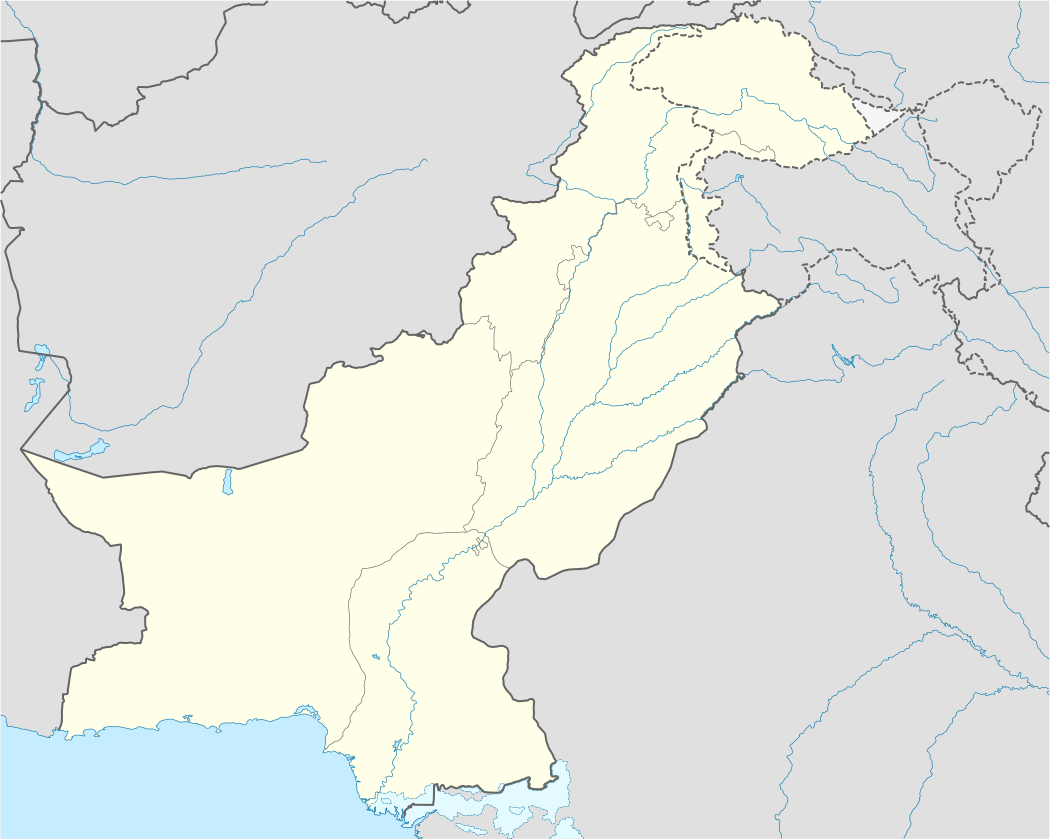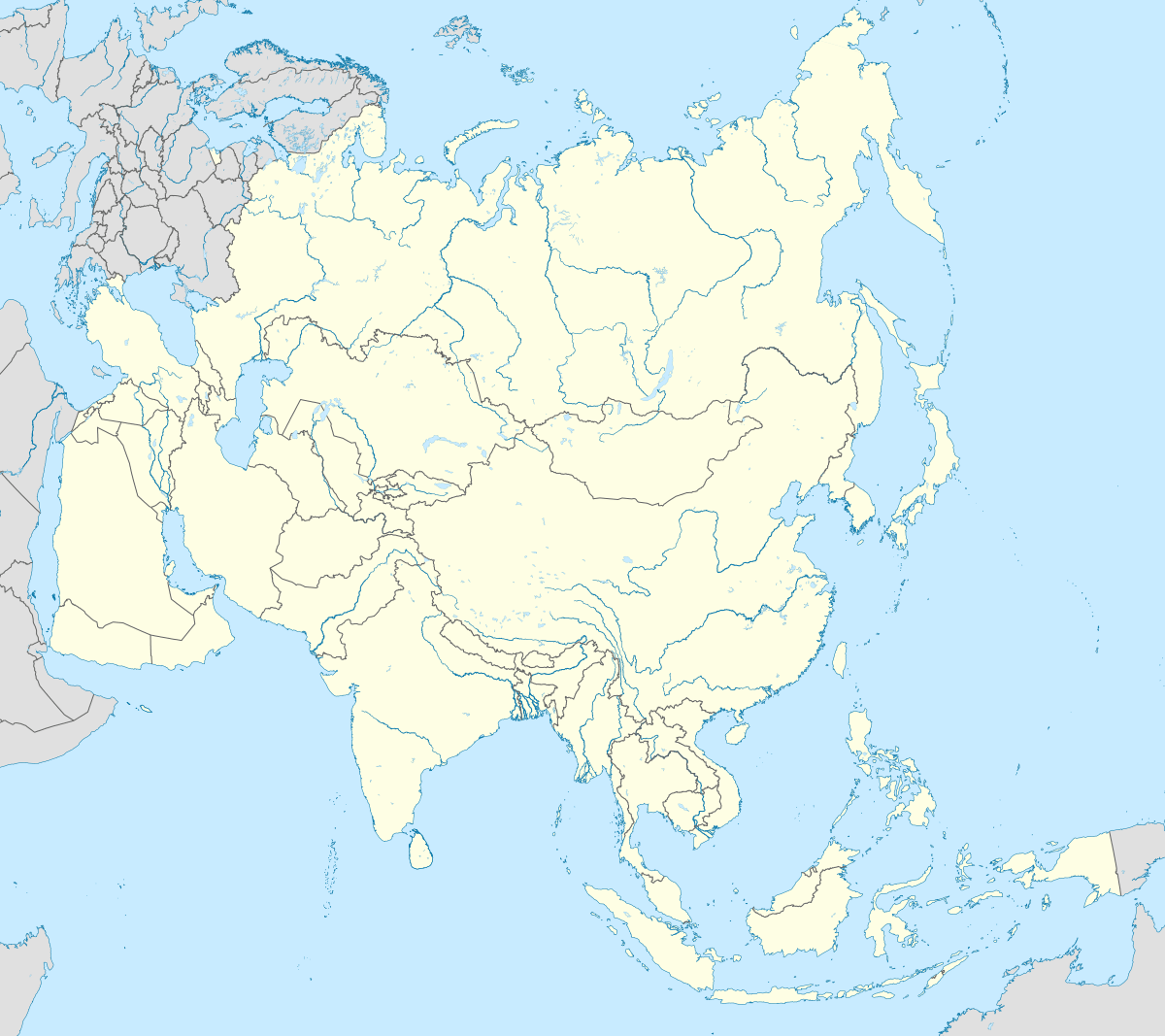Panj Tirath
Panj Tirath is Hindu religious site located in Hashtnagri in Peshawar, Khyber Pakhtunkhwa, Pakistan.It is over 1000-yr-old Hindu religious site. Panj Tirath derived its name from the five pools of water present there. It was declared as the national heritage of Pakistan.[1][2][3][3]Before Pakistan was formed, there were five temples and five wells there where members of the Hindu community would wash before prayers. Three temples now have collapsed due to lack of maintenance.[4]
| Panj Tirath | |
|---|---|
 1000-yr-old Hindu religious site. | |
| Religion | |
| Affiliation | Hinduism |
| District | Peshawar District |
| Deity | Kartikeya |
| Location | |
| Location | Hashtnagri |
| State | Khyber Pakhtunkhwa |
| Country | |
 Shown within Pakistan  Panj Tirath (Asia) | |
| Geographic coordinates | 34°00′48.4″N 71°34′44.5″E |
History
It is believed that Pandu, a king in the Mahabharata, belonged to this area and Hindus used to come to these pools for bathing during the month of Karteek and worship for two days under the trees. The sacred ponds and temples were damaged during the reign of the Afghan Durrani dynasty(1747-1834) in 1747, however it was restored by local Hindus during the period of Sikh rule(1834-1848) in 1834 and worship started again.[5][6][7]
Panj Tirath was an important Hindu pilgrimage site in Peshawar before 1947. Archaeologist SM Jaffar in his book An Introduction to Peshawar, published in 1952, wrote that, “The Panj-Tirath (five tanks) is among the places of interest and antiquity in or around Peshawar, dating back to the Buddhist times. Archaeologists believe Panj Tirath holds marks of the Buddha’s Begging Bowl.”
English archaeologist Sir Alexander Cunningham and French archaeologist Alfred Foucher have also identified the site with the place of Buddha's Alam Bowl. The Brahmans of today and Munshi Gopal Das, the author of Tareekh-e-Peshawar published in 1874, trace its origin to the five sons of Pandu (the Heroes of the Mahabharata).[8]
As a National heritage
The provincial Khyber Pakhtunkhwa government in northwest Pakistan declared the ancient Hindu religious site of Panj Tirath in Peshawar as national heritage in January3,2019. The five pools of the heritage site now come under the ambit of Chacha Yunus Park and Khyber Pakhtunkhwa Chamber of Commerce and Industry.
The KP Directorate of Arcahaeology and Museums issued a notification under the KP Antiquities Act 2016 declaring the land in the Panj Tirath park as a heritage site. The government also announced a fine of up to Rs 2 million and five years' imprisonment for anyone found guilty of damaging the historic site. The archaeology directorate asked the Khyber Pakhtunkhwa government to clear the site of encroachment and allow archaeologists to carry out much needed preservation work. It also asked for the construction of a boundary wall around the site.[9]
Protest to reclaim Panj Tirath as temple
The local Hindu community in Peshawar has asked the government to hand over a centuries-old Hindu site to them so that they can use its temple. The Peshawar Hindu Panchayat Rajpot Welfare Society appreciated the government's move to declare it a national heritage site but asked it clear the temples and their surrounding land of encroachments. The secretary and deputy secretary of the Evacuees Trust Property Board Lahore had visited and assured the society that the temple would be given to them, however, nothing has been done yet.[10]
Pakistan's Evacuee Property Trust Board (EPTB), which manages the shrines of Hindus and Sikhs, has stopped the district administration of Peshawar from taking control of temples in Panj Tirath, a Hindu religious site which has been declared as the national heritage. The EPTB said that no one can take control of the temples in Panj Tirath unless two cases pending in the Peshawar High Court are decided.[11]
See also
- Hinglaj Mata
- Katas Raj Temples
References
- "Pakistan declares Panj Tirath Hindu religious site as national heritage". Hindustan times. 3 January 2019.
- "From ponds to park: 'Panj Tirath belongs to the nation, not one dept'". The Express Tribune. 10 September 2013.
- "Pakistan declares over 1000-yr-old Panj Tirath Hindu religious site in Khyber Pakhtunkhwa as national heritage". www.timesnownews.com.
- https://www.samaa.tv/news/2019/01/peshawars-hindu-community-wants-panj-tirath-a-centuries-old-religious-site-handed-over-to-it/
- https://www.thefridaytimes.com/panj-tirath-heritage-lost-to-the-ravages-of-time/
- Reporter, W. H. N. (January 6, 2019). "Pakistan declares Panj Tirath Hindu religious site as national heritage".
- Staff, Scroll. "Pakistan declares ancient Hindu religious site Panj Tirath to be national heritage". Scroll.in.
- https://www.thefridaytimes.com/panj-tirath-heritage-lost-to-the-ravages-of-time/
- "Pakistan declares Panj Tirath Hindu religious site as national heritage - Times of India". The Times of India.
- https://www.samaa.tv/news/2019/01/peshawars-hindu-community-wants-panj-tirath-a-centuries-old-religious-site-handed-over-to-it/
- https://www.thehindu.com/news/international/pakistan-minority-shrine-body-bars-peshawar-admin-from-taking-control-of-panj-tirath/article25992810.ece